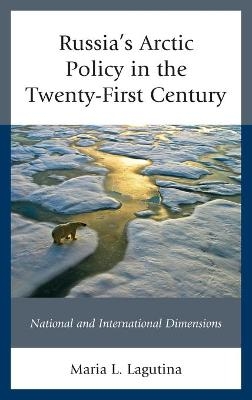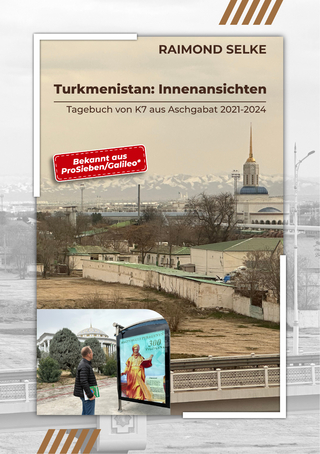
Russia's Arctic Policy in the Twenty-First Century
National and International Dimensions
Seiten
2019
Lexington Books (Verlag)
978-1-4985-5157-1 (ISBN)
Lexington Books (Verlag)
978-1-4985-5157-1 (ISBN)
This book deals with the current Arctic policy of Russia in its domestic and foreign dimensions in global epoch. It offers the first comprehensive examination of Russia's arctic interests, approaches, and strategy in different areas: from political issues to social policy, and main difficulties and challenges in the modern Russian Arctic.
This book is devoted to the analysis of all aspects of the current Arctic policy of Russia, the main strategic interests of Russia and the basics of the current Russian Policy in the region taking into account new global trends. This monograph ambitions to compile in one comprehensive study domestic and international aspects of modern Russian Arctic policy, based mainly on Russian sources that allowed the author to reveal the specifics of Russian approach to modern Arctic issues. It raises a set of important research questions: What are the main interests of Russia in the modern Arctic? What areas are the priorities in the Russian Arctic policy? Who governs the Russian Arctic? How are decisions on the Arctic made in Russia? What kind of problems is faced the Russian Arctic in global epoch? How do bilateral and multilateral relations between Russia and other Arctic states impact regional developments in the Arctic? How is Russia dealing with non-Arctic states and non-state Arctic actors? How are Russia's domestic and foreign policy in the Arctic interrelated? How is Russia’s Arctic policy likely to evolve in the future, in a changing global context? The book argues that nowadays the Arctic vector is one of the main priorities for Russia’s domestic and foreign policies and, undoubtedly, Russia’s future is connected with development of the Arctic – a region occupying a large part of the country’s territory. On the one hand, the main purpose of the current Arctic policy of Russia is the ‘re-development’ and modernization of the Arctic zone of the Russian Federation (AZRF) after the period of following the breakup of the USSR that was detrimental to the Russian Arctic policies. Moreover, today the ‘re-development’ of the Arctic is the most important prerequisite of the restoration of Russia’s great power status. On the other hand, it is obvious that current Russia’s Arctic strategy should be duly adapted to the new global realities – not only the ones formed in the wake of the breakup of the USSR and the end of the Cold War, but also to the latest developments as ‘globalization’.
This book is devoted to the analysis of all aspects of the current Arctic policy of Russia, the main strategic interests of Russia and the basics of the current Russian Policy in the region taking into account new global trends. This monograph ambitions to compile in one comprehensive study domestic and international aspects of modern Russian Arctic policy, based mainly on Russian sources that allowed the author to reveal the specifics of Russian approach to modern Arctic issues. It raises a set of important research questions: What are the main interests of Russia in the modern Arctic? What areas are the priorities in the Russian Arctic policy? Who governs the Russian Arctic? How are decisions on the Arctic made in Russia? What kind of problems is faced the Russian Arctic in global epoch? How do bilateral and multilateral relations between Russia and other Arctic states impact regional developments in the Arctic? How is Russia dealing with non-Arctic states and non-state Arctic actors? How are Russia's domestic and foreign policy in the Arctic interrelated? How is Russia’s Arctic policy likely to evolve in the future, in a changing global context? The book argues that nowadays the Arctic vector is one of the main priorities for Russia’s domestic and foreign policies and, undoubtedly, Russia’s future is connected with development of the Arctic – a region occupying a large part of the country’s territory. On the one hand, the main purpose of the current Arctic policy of Russia is the ‘re-development’ and modernization of the Arctic zone of the Russian Federation (AZRF) after the period of following the breakup of the USSR that was detrimental to the Russian Arctic policies. Moreover, today the ‘re-development’ of the Arctic is the most important prerequisite of the restoration of Russia’s great power status. On the other hand, it is obvious that current Russia’s Arctic strategy should be duly adapted to the new global realities – not only the ones formed in the wake of the breakup of the USSR and the end of the Cold War, but also to the latest developments as ‘globalization’.
Maria Lagutina is associate professor and vice-head of World Politics Department at St. Petersburg State University.
Chapter 1. Russia in the Arctic: historical background and current situation
Chapter 2. Russian Arctic Policy: National dimension
Chapter 3. Russian Arctic Policy: International dimension
| Erscheinungsdatum | 10.05.2021 |
|---|---|
| Reihe/Serie | Russian, Eurasian, and Eastern European Politics |
| Verlagsort | Lanham, MD |
| Sprache | englisch |
| Maße | 159 x 231 mm |
| Gewicht | 440 g |
| Themenwelt | Reiseführer ► Europa ► Russland |
| Sozialwissenschaften ► Politik / Verwaltung ► Europäische / Internationale Politik | |
| ISBN-10 | 1-4985-5157-2 / 1498551572 |
| ISBN-13 | 978-1-4985-5157-1 / 9781498551571 |
| Zustand | Neuware |
| Haben Sie eine Frage zum Produkt? |
Mehr entdecken
aus dem Bereich
aus dem Bereich
Tagebuch von K7 aus Aschgabat 2021-2024
Buch | Softcover (2024)
Piefke Trading Central Europe (Verlag)
35,00 €
Buch | Softcover (2021)
DuMont Reiseverlag
18,95 €

